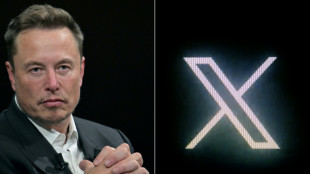

Brazil's shutdown of X fans debate over free speech curbs
Is Brazil's shutdown of Elon Musk's X a drastic but necessary move in the global fight against disinformation, or pure censorship?
Supreme Court judge Alexandre de Moraes's decision to block the social media platform formerly known as Twitter has reignited a debate about where to draw the line between upholding free expression and combatting hate speech.
The shutdown affected 22 million X users in Brazil, many of whom have begun migrating to smaller platforms such as Bluesky and Threads to avoid hefty fines for using Musk's network.
Moraes blocked X in its biggest Latin American market after Musk refused to comply with orders to remove dozens of right-wing accounts and then failing to name a legal representative, as required under Brazilian law.
The showdown between the Brazilian and the US billionaire, who has been accused of turning X into a megaphone for right-wing conspiracy theories, comes amid growing scrutiny in the West of X and other social media titans.
In France, the Russian-born founder of the controversial Telegram app, Pavel Durov, was arrested last month and charged with failing to curb extremist and illegal content on his network, which has 900 million users.
TikTok, meanwhile, is in the crosshairs of the US Federal Trade Commission, which accuses it of violating child privacy laws.
But it is arguably Musk, a self-described "free speech absolutist" who has been using his platform to whip up support for right-wingers from Brazil to Britain, who is drawing the most fire.
The European Union is considering imposing a hefty fine on X and even a shutdown for possible violations of tough new social media regulations.
"Brazil has clearly joined the global debate on social media and free speech," Carl Tobias, a law professor at the University of Richmond in the United States, told AFP.
The shutdown of X in Brazil "reflects similar concerns about how best to regulate social media... in the US, many other democracies, and the EU," he said.
- 'Global problem' -
Afonso de Albuquerque, professor of communications at Rio's Federal Fluminense University, cast the Moraes-Musk dust-up as part of a wider battle for "the sovereignty of nations" against "powerful multi-millionaires."
"Elon Musk is a global problem", he told AFP.
The world's richest man, according to Forbes magazine, "bought Twitter and turned it into a political project, which has to do with to his involvement in far-right networks," Albuquerque asserted.
Musk has been a vociferous campaigner for the return of former US president Donald Trump to the White House.
He has also been vocal in his support for far-right Brazilian ex-president Jair Bolsonaro, whose supporters staged a failed US-style attack on government buildings in 2023 following his unsuccessful re-election bid.
- Brazil's 'democracy killer' -
Moraes's action against X has been applauded by the Brazilian left, including President Luiz Inacio Lula da Silva.
"Who does (Musk) think he is?" Lula asked, arguing that democracy was "not the right to lie, spread hate or violate the will of the people."
Elvino Bohn Gass, an MP from Lula's Workers' Party, accused Musk of trying to "digitally colonize" Brazil.
But for Bolsonaro's supporters, the shutdown has become a cause celebre.
Thousands demonstrated in Sao Paulo on Saturday in defense of "democracy" and "liberty" against what they called Moraes's "censorship."
Some have disregarded the X ban, including Bolsonaro's son Eduardo, an MP, who accuses Moraes of "assassinating democracy."
- 'Political' move? -
Polls show Brazilians divided on the justification for the shutdown of X, with an AtlasIntel poll of over 1,600 people showing that 56.5 see it as a "political" move by Moraes.
Just over 54 percent declared it "weakens democracy," despite nearly half -- 49.7 percent -- expressing support for Moraes.
Beyond Brazil, the standoff is closely watched by both sides in what Britain's The Economist magazine called a "culture war battleground."
The Economist criticized the blocking of X as part of a growing trend to try to "censor and punish speech that should be within the law."
"Only with the freedom to be wrong can societies advance slowly towards what is right," the magazine argued.
N.Connor--IP




